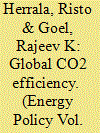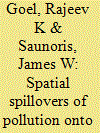| Srl | Item |
| 1 |
ID:
113488


|
|
|
|
|
| Publication |
2012.
|
| Summary/Abstract |
This paper examines global carbon dioxide (CO2) efficiency by employing a stochastic cost frontier analysis of about 170 countries in 1997 and 2007. The main contribution lies in providing a new approach to environmental efficiency estimation, in which the efficiency estimates quantify the distance from the policy objective of minimum emissions. We are able to examine a very large pool of nations and provide country-wise efficiency estimates. We estimate three econometric models, corresponding with alternative interpretations of the Cancun vision (Conference of the Parties 2011). The models reveal progress in global environmental efficiency during a preceding decade. The estimates indicate vast differences in efficiency levels, and efficiency changes across countries. The highest efficiency levels are observed in Africa and Europe, while the lowest are clustered around China. The largest efficiency gains were observed in central and eastern Europe. CO2 efficiency also improved in the US and China, the two largest emitters, but their ranking in terms of CO2 efficiency deteriorated. Policy implications are discussed.
|
|
|
|
|
|
|
|
|
|
|
|
|
|
|
|
| 2 |
ID:
150667


|
|
|
|
|
| Summary/Abstract |
In the climate agreement reached in Paris on the 12th of December 2015, the participating countries agreed to provide information about their Intended Nationally Determined Contribution, and also to assess its fairness and ambition. This study contributes a transparent empirical econometric tool for such an assessment. It shows that, using a formal decomposition framework that uniquely disentangles the macroeconomic and other influences on emissions, effort sharing in global greenhouse gas reductions can be achieved in a way that promotes innovation and environmental efficiency to reduce emissions without interfering with the right of poor countries to catch up economically. Based on GDP projections by the IMF and the OECD in a sample of about 185 countries, it presents country level CO2 emission targets applicable as benchmarks to assess the adequacy and fairness of national contributions.
|
|
|
|
|
|
|
|
|
|
|
|
|
|
|
|
| 3 |
ID:
176879


|
|
|
|
|
| Summary/Abstract |
This paper examines the spatial spillovers of pollution onto the underground economy. The extant literature has considered the pollution-informal economy nexus to some extent, but the spillover effects across national borders have been ignored. Pollution can increase the underground sector when some formal sector production moves to the informal sector (“scale effect”), whereas greater pollution can reduce the underground sector when it invites tougher regulations (“substitution effect”). Results, based on a panel of more than 130 nations and allowing for reverse causality, show both own- and border pollution reduce the underground sector - consistent with the substitution effect. In other results, we find opposite effects of economic and political freedom, and some differences in the influences of specific dimensions of economic freedom and the role of the government. Further, we find that while the size of government increases the underground sector, better institutional quality reduces it. Policy implications of these findings are discussed. The spillovers from neighboring nations are especially relevant for nations that are not islands, which is true for a majority of countries around the world.
|
|
|
|
|
|
|
|
|
|
|
|
|
|
|
|